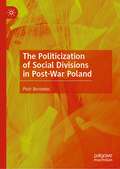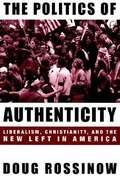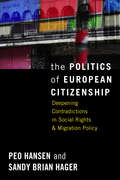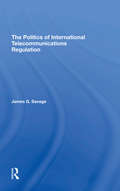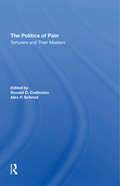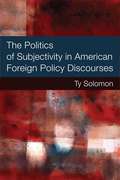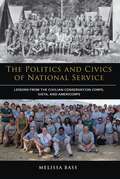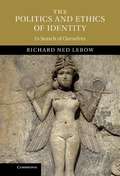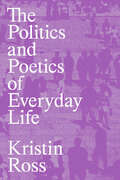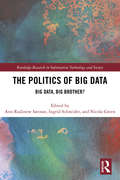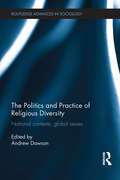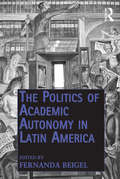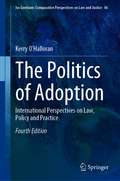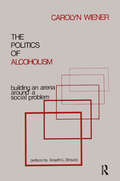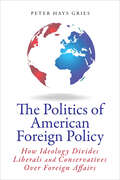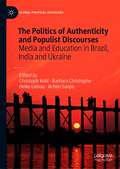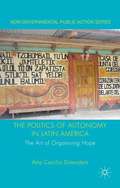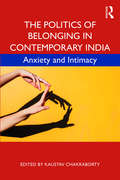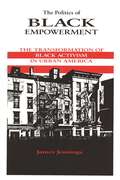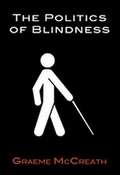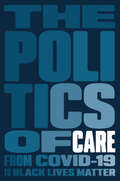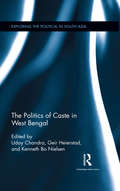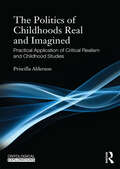- Table View
- List View
The Politicization of Social Divisions in Post-War Poland
by Piotr BorowiecThe monograph examines the sources of Polish social divisions. It explains their emergence and discusses the mechanisms behind their evolution from 1945-2022. The findings corroborate the idea that divisions were formed irrespective of the current state of social hierarchy, or the accepted interpretation of justice, and that they existed both in totalitarian and democratic systems alike. The book distinguishes the category of divisions from the practices of repartition, and demonstrates that the repartitions discussed in a political discourse do not generate divisions, but constitute the politicization of the latter. Repartitions are understood as discursive, dichotomic juxtapositions that result from the existence of divisions and can be used as political tools. It has been demonstrated that they can also function as analytical categories used with a view to determining the state of social inequalities. The notions of divisions and repartitions discussed in this volume confirm the existence of the continuity of changes and describe the evolution of Polish society has a consequence.
The Politics Of Authenticity: Liberalism, Christianity, and the New Left in America (Revised Edition)
by Doug Rossinow Douglas RossinowDoug Rossinow presents here a vital reevaluation of the origins and aims of the new left student movement that arose in the 1960s. Focusing on the University of Texas at Austin, Rossinow shows how questions of race, class, gender, and religion all came to bear on the politics of radical white students, informing their collective search for social justice and their personal quests for authenticity. This book is sure to be a useful and insightful resource for historians of American culture and politics, and for general readers who seek to understand this chapter of American radicalism.
The Politics Of European Citizenship
by Sandy Brian Hager Peo HansenAs the European Union faces the ongoing challenges of legitimacy, identity, and social cohesion, an understanding of the social purpose and direction of EU citizenship becomes increasingly vital. This book is the first of its kind to map the development of EU citizenship and its relation to various localities of EU governance. From a critical political economy perspective, the authors argue for an integrated analysis of EU citizenship, one that considers the interrelated processes of migration, economic transformation, and social change and the challenges they present.
The Politics Of International Telecommunications Regulation
by James G SavageThis book explains the international telecommunication union and its role in the politics of international telecommunications. It focuses on the key areas of frequency spectrum allocation, the avoidance of deliberate interference, and the setting of international telecommunications standards.
The Politics Of Pain: Torturers And Their Masters
by Ronald D Crelinsten Alex SchmidAlthough a wave of democratization appears to be sweeping the globe, torture persists in more than seventy-five nations. Despite widespread condemnation of torture and the efforts of international and nongovernmental organizations to end it, the "politics of pain" continues in a broad range of social and political systems. This book is one of the first to systematically examine the psychological, cultural, and social origins of torture. It provides profiles of torturers and of those who direct them in their brutal activities. The contributors provide case studies from the past and present, including Somoza's National Guard in Nicaragua and regimes in the Southern Cone of Latin America and in Greece.
The Politics Of Reality: Essays In Feminist Theory
by Marilyn FryeEssays examine sexism, the gay rights movement, the exploitation of women by men, and other topics from a feminist perspective.
The Politics Of Subjectivity In American Foreign Policy Discourses
by Ty SolomonWhy are some discourses more politically efficacious than others? Seeking answers to this question, Ty Solomon develops a new theoretical approach to the study of affect, identity, and discourse--core phenomena whose mutual interweaving have yet to be fully analyzed in International Relations. Drawing upon Jacques Lacan's psychoanalytic theory and Ernesto Laclau's approach to hegemonic politics, Solomon argues that prevailing discourses offer subtle but powerfully appealing opportunities for affective investment on the part of audiences. Through empirical case studies of the affective resonances of the war on terror and the rise and fall of neoconservative influence in American foreign policy, Solomon offers a unique way to think about the politics of identity as the construction of "common sense" powerfully underpinned by affective investments. He provides both a fuller understanding of the emotional appeal of political rhetoric in general and, specifically, a provocative explanation of the reasons for the reception of particular U. S. foreign policy rhetoric that shifted Americans' attitudes toward neoconservative foreign policy in the 1990s and shaped the post-9/11 "war on terror. "
The Politics and Civics of National Service: Lessons from the Civilian Conservation Corps, VISTA, and AmeriCorps
by Melissa BassIn 1933 President Franklin D. Roosevelt created America's first domestic national service program: the Civilian Conservation Corps (CCC). As part of this program-the largest and most highly esteemed of its kind-nearly three million unemployed men worked to rehabilitate, protect, and build the nation's natural resources. It demonstrated what citizens and government could accomplish together. Yet despite its success, the CCC was short lived. While more controversial programs such as President Johnson's Volunteers in Service to America (VISTA) and President Clinton's AmeriCorps survived, why did CCC die? And why-given the hard-won continuation and expansion of AmeriCorps-is national service an option for fewer Americans today than at its start nearly eighty years ago?In The Politics and Civics of National Service, Melissa Bass focuses on the history, current relevance, and impact of domestic civilian national service. She explains why such service has yet to be deeply institutionalized in the United States; while military and higher education have solidified their roles as American institutions, civilian national service is still not recognized as a long-term policy option. Bass argues that only by examining these programs over time can we understand national service's successes and limitations, both in terms of its political support and its civics lessons. The Politics and Civics of National Service furthers our understanding of American political development by comparing programs founded during three distinct political eras-the New Deal, theGreat Society, and the early Clinton years-and tracing them over time. To a remarkable extent, the CCC, VISTA, and AmeriCorps reflect the policymaking ethos and political controversies of their times, illuminating principles that hold well beyond the field of national service. By emphasizing these programs' effects on citizenship and civic engagement, The Politics and Civics of National Service deepens our understanding of how governmental programs can act as "public policy for democracy."
The Politics and Ethics of Identity
by Richard Ned LebowWe are multiple, fragmented, and changing selves who, nevertheless, believe we have unique and consistent identities. What accounts for this illusion? Why has the problem of identity become so central in post-war scholarship, fiction, and the media? Following Hegel, Richard Ned Lebow contends that the defining psychological feature of modernity is the tension between our reflexive and social selves. To address this problem Westerners have developed four generic strategies of identity construction that are associated with four distinct political orientations. Lebow develops his arguments through comparative analysis of ancient and modern literary, philosophical, religious, and musical texts. He asks how we might come to terms with the fragmented and illusionary nature of our identities and explores some political and ethical implications of doing so.
The Politics and Poetics of Everyday Life
by Kristin RossUsing the concept of the everyday as a lever for social transformationThe texts in this volume represent Kristin Ross&’s attempt to think the question of the everyday across a range of discourses, practices and knowledges, from philosophy to history, from the visual arts to popular fiction, all the way to the forms taken by collective political action in the territorial struggles of today. If everyday life is, as many have come to believe, the ideal vantage point for an analysis of the social, it is also the crucial first step in its transformation.The volume opens with a return to Henri Lefebvre&’s powerful attempt to use the everyday as both residue and resource, as the site of profound alienation and—by the same token—the site where all emancipatory initiatives and desires begin.The second section focuses on our attempts to represent our lived reality to ourselves in cultural forms, from painting and literature and film to an analysis of the contemporary transformations of the sub-genre most embedded in the deep superficiality of everyday life: detective fiction.The final section turns to present-day ecological occupations in the wake of the zad at Notre-Dame-des-Landes, and locates the everyday as a site for rich oppositional resources and immanent social creativity.
The Politics and Policies of Big Data: Big Data, Big Brother? (Routledge Research in Information Technology and Society)
by Nicola Green Ann Rudinow Sætnan Ingrid SchneiderBig Data, gathered together and re-analysed, can be used to form endless variations of our persons - so-called ‘data doubles’. Whilst never a precise portrayal of who we are, they unarguably contain glimpses of details about us that, when deployed into various routines (such as management, policing and advertising) can affect us in many ways. How are we to deal with Big Data? When is it beneficial to us? When is it harmful? How might we regulate it? Offering careful and critical analyses, this timely volume aims to broaden well-informed, unprejudiced discourse, focusing on: the tenets of Big Data, the politics of governance and regulation; and Big Data practices, performance and resistance. An interdisciplinary volume, The Politics of Big Data will appeal to undergraduate and postgraduate students, as well as postdoctoral and senior researchers interested in fields such as Technology, Politics and Surveillance.
The Politics and Practice of Religious Diversity: National Contexts, Global Issues (Routledge Advances in Sociology)
by Andrew DawsonThe Politics and Practice of Religious Diversity engages with one of the most characteristic features of modern society. An increasingly prominent and potentially contentious phenomenon, religious diversity is intimately associated with contemporary issues such as migration, human rights, social cohesion, socio-cultural pluralisation, political jurisdiction, globalisation, and reactionary belief systems. This edited collection of specially-commissioned chapters provides an unrivalled geographical coverage and multidisciplinary treatment of the socio-political processes and institutional practices provoked by, and associated with, religious diversity. Alongside chapters treating religious diversity in the ‘BRIC’ countries of Brazil, Russia, India and China, are contributions which discuss Australia, Finland, Mexico, South Africa, the UK, and the United States. This book provides an accessible, distinctive and timely treatment of a topic which is inextricably linked with modern society’s progressively diverse and global trajectory. Written and structured as an accessible volume for the student reader, this book is of immediate interest to both academics and laypersons working in mainstream and political sociology, sociology of religion, human geography, politics, area studies, migration studies and religious studies.
The Politics of Academic Autonomy in Latin America (Public Intellectuals and the Sociology of Knowledge)
by Fernanda BeigelAcademic autonomy has been a dominant issue among Latin American social studies, given that the production of knowledge in the region has been mostly suspected for its lack of originality and the replication of Euro-American models. Politicization within the higher education system and recurrent military interventions in universities have been considered the main structural causes for this heteronomy and, thus, the main obstacles for 'scientific' achievements. This groundbreaking book analyses the struggle for academic autonomy taking into account the relevant differences between the itinerary of social and natural sciences, the connection of institutionalization and prestige-building, professionalization and engagement. From the perspective of the periphery, academic dependence is not merely a vertical bond that ties active producers and passive reproducers. Even though knowledge produced in peripheral communities has low rates of circulation within the international academic system, this doesn't imply that their production is - or always has been - the result of a massive import of foreign concepts and resources. This book intends to show that the main differences between mainstream academies and peripheral circuits are not precisely in the lack of indigenous thinking, but in the historical structure of academic autonomy, which changes according to a set of factors -mainly the role of the state in the higher education system. This historical structure explains the particular features of the process of professionalization in Latin American scientific fields.
The Politics of Adoption: International Perspectives on Law, Policy and Practice (Ius Gentium: Comparative Perspectives on Law and Justice #86)
by Kerry O’HalloranThis book, which updates and expands the third edition published by Springer in 2015, explains, compares and evaluates the social and legal functions of adoption within a range of selected jurisdictions and on an international basis. From the standpoint of the development of adoption in England & Wales, and the changes currently taking place there, it considers the process as it has evolved in other countries. It also identifies themes of commonality and difference in the experience of adoption in a common law context, comparing and contrasting this with the experience under civil law and in Islamic countries and with that of indigenous people. This book includes new chapters examining adoption in Russia, Korea and Romania. Further, it uses the international conventions and the associated ECtHR case law to benchmark developments in national law, policy and practice and to facilitate a cross-cultural comparative analysis.
The Politics of Alcoholism: Building an Arena Around a Social Problem
by Carolyn WienerThe Politics of Alcoholism can be read on one level as a fascinating history of the evolving politics of what this country is doing about “the problem of alcoholism.” Not so long ago that problem was scarcely larger than a human hand against the horizon, but now it makes good, regular newspaper copy. This text follows through on the much-raised question of how a social problem becomes defined as a large scale problem, when the same phenomenon x Preface now labeled as “a problem” was not so named before. What is offered here is a direct attack on the rise into public visibility of something previously the concern of a relatively small number of people and groups, and which gets defined along the way as a problem for the whole nation. The second issue addressed is closer to the political scientist’s traditional interest, namely the politics of handling public issues: research and theorizing here usually focus on interest groups, lobbying, public debate, legislative rights, constituencies, and so on.
The Politics of American Foreign Policy: How Ideology Divides Liberals and Conservatives over Foreign Affairs
by Peter Hays GriesIn this provocative book, Peter Gries directly challenges the widely held view that partisan elites on Capitol Hill are out of touch with a moderate American public. Dissecting a new national survey, Gries shows how ideology powerfully divides Main Street over both domestic and foreign policy and reveals how and why, with the exception of attitudes toward Israel, liberals consistently feel warmer toward foreign countries and international organizations, and desire friendlier policies toward them, than conservatives do. And because most Congressional districts have become hyper-partisan, many politicians today cater not to the "median voter" in their districts, but to the primary voters who elect them. The perverse incentives of the U.S. electoral system, therefore, are empowering the ideological extremes, contributing to elite partisanship over American foreign policy. The Politics of American Foreign Policy weaves seamlessly together in-depth examinations of the psychological roots and foreign policy consequences of the liberal-conservative divide, the cultural, socio-racial, economic, and political dimensions of American ideology, and the moral values and foreign policy orientations that divide Democrats and Republicans. Within this context, the book explores in detail why American liberals and conservatives disagree over US policy relating to Latin America, Europe, the Middle East, East Asia, and international organizations such as the UN.
The Politics of Antisocial Behaviour: Amoral Panics (Routledge Advances in Criminology #Vol. 3)
by Stuart WaitonAntisocial behaviour is becoming a universally accepted problem and one that dominates the political and popular imagination. By providing a new criminological framework for understanding the fear of crime, this book reposes the increasingly important debate around antisocial behaviour and the internationally understood idea of moral panics. Through a critical engagement with theories of risk, the book develops Furedi’s understanding of a Culture of Fear to illustrate how firstly, society today is best understood to be in a permanent state of anxiety, and secondly, how this state of affairs has arisen due to the collapse of traditional politics and morality, and equally, of radical alternatives to it. Central to Waiton's thesis is an explanation of the changing therapeutic relationship between the individual and society based on an understanding of diminished subjectivity and the newly emerged vulnerable public.
The Politics of Authenticity and Populist Discourses: Media and Education in Brazil, India and Ukraine (Global Political Sociology)
by Christoph Kohl Heike Liebau Barbara Christophe Achim SaupeThis edited volume breaks new ground and opens up new perspectives by capturing the role played by claims to authenticity in populist discourses in Brazil, India and Ukraine. By conceiving of both triumphant populism and increasing demands for authenticity as expressions of crisis, the volume seeks to satisfy the need to take a closer look at yearnings for orientation in a globalised world that is often associated with rapid social change and the disappearance of old certainties. Starting from the assumption that media play a crucial role for populist discourses of authenticity, the volume moves beyond conventional and social media by expanding its focus to media in formal education, notably school textbooks and curricula. These two particular media formats lastingly shape younger generations and thus the future. The proposed volume adopts global perspectives from three postcolonial countries that are often beyond the scope of studies dealing with populist discourses and media entanglements – insights that contribute new aspects to international scholarly debates.
The Politics of Autonomy in Latin America
by Ana Cecilia DinersteinThe author contests older concepts of autonomy as either revolutionary or ineffective vis-à-vis the state. Looking at four prominent Latin American movements, she defines autonomy as 'the art of organising hope': a tool for indigenous and non-indigenous movements to prefigure alternative realities at a time when utopia can be no longer objected.
The Politics of Belonging in Contemporary India: Anxiety and Intimacy
by Kaustav ChakrabortyThis volume looks at the emerging forms of intimacies in contemporary India. Drawing on rigorous academic research and pop culture phenomena, the volume: Brings together themes of nationhood, motherhood, disability, masculinity, ethnicity, kinship, and sexuality, and attempts to understand them within a more complex web of issues related to space, social justice, marginality, and communication; Focuses on the struggles for intimacy by the disabled, queer, Dalit, and other subalterns, as well as people with non-human intimacies, to propose an alternative theory of the politics of belonging; Explores the role of social and new media in understanding and negotiating intimacies and anxieties. Comprehensive and thought-provoking, this book will be useful to scholars and researchers of political studies, sociology, sexuality and gender studies, women’s studies, cultural studies, and minority studies.
The Politics of Black Empowerment: The Transformation of Black Activism in Urban America
by James JenningsIn analyzing Black politics since the late 1960s, James Jennings focuses on both the behavioral aspects, such as individual and group characteristics of voting and nonvoting and elections, as well a more fundamental philosophical and cultural questions regarding Black politics. This study examines how the "traditional" face of Black politics and electoral activism interacts with a growing "progressive" face of Black politics. While traditional Black political activists seek access or political incorporation, another group aims for power sharing. The traditional approach is sometimes satisfied with merely replacing white politicians with Blacks, but the progressive constituency focuses on fundamentally changing the whole economic and political pie. Activist desirous of Black empowerment are pursuing a political and economic orientation that goes beyond programs based on access to American institutional arrangements and attempting to change or alter given political arrangements and social relations between Blacks and whites on the basis of changing the social structure and the distribution of wealth and power. Based on interviews with Black and Latino activist in several big cities as well as review of the literature and the Black newspapers around the country, The Politics of Black Empowerment describes the characteristics of Black empowerment activism in America.
The Politics of Blindness: From Charity to Parity
by Graeme Mccreath<P>This book provides a rallying cry so that the voice of users of services can be heard, and both the provision of services can be tailored by and shaped to their needs. <P>The anti-discrimination clause, which I was proud to contribute to in the extension of the Disability Discrimination Act, the creation of the Disability Rights Commission (now part of the Equality and Human Flights Commission) and the Office of Disability inside UK government, has enabled individual and collective experience of inequality and discrimination to be tackled head on.
The Politics of Care
by Boston ReviewA vital collection bringing together Black Lives Matter and COVID-19 from the acclaimed political and literary magazine Boston Review.From the COVID-19 pandemic to uprisings over police brutality, we are living in the greatest social crisis of a generation. But the roots of these latest emergencies stretch back decades. At their core is a politics of death: a brutal neoliberal ideology that combines deep structural racism with a relentless assault on social welfare. Its results are the failing economic and public health systems we confront today--those that benefit the few and put the most vulnerable in harm's way.Contributors to this volume not only protest these neoliberal roots of our present catastrophe, but they insist there is only one way forward: a new kind of politics--a politics of care--that centers people's basic needs and connections to fellow citizens, the global community, and the natural world. Imagining a world that promotes the health and well-being of all, they draw on different backgrounds--from public health to philosophy, history to economics, literature to activism--as well as the example of other countries and the past, from the AIDS activist group ACT-UP to the Black radical tradition. Together they point to a future, as Simon Waxman writes, where "no one is disposable."CONTRIBUTORSRobin D. G. Kelley, Gregg Gonsalves and Amy Kapczynski, Walter Johnson, Anne L. Alstott, Melvin Rogers, Amy Hoffman, Sunaura Taylor, Vafa Ghazavi, Adele Lebano, Paul Hockenos, Paul Katz and Leandro Ferreira, Shaun Ossei-Owusu, , Colin Gordon, Jason Q. Purnell, Jamala Rogers, Dan Berger, Julie Kohler, Manoj Dias-Abey, Simon Waxman, Farah Griffin.A co-publication between Boston Review and Verso Books.
The Politics of Caste in West Bengal (Exploring the Political in South Asia)
by Kenneth Bo Nielsen Uday Chandra Geir HeierstadThis volume offers for the first time a comprehensive and in-depth analysis of the making and maintenance of a modern caste society in colonial and postcolonial West Bengal in India. Drawing on cutting-edge multidisciplinary scholarship, it explains why caste continues to be neglected in the politics of and scholarship on West Bengal, and how caste relations have permeated the politics of the region until today. The essays presented here dispel the myth that caste does not matter in Bengali society and politics, and make possible meaningful comparisons and contrasts with other regions in South Asia. The work will interest scholars and researchers in sociology, social anthropology, politics, modern Indian history and cultural studies.
The Politics of Childhoods Real and Imagined: Practical Application of Critical Realism and Childhood Studies
by Priscilla AldersonThe second volume of Priscilla Alderson’s popular and renowned book Childhoods Real and Imagined relates dialectical critical realism to childhood. By demonstrating their relevance and value to each other, Alderson presents a practical introductory guide for applying critical realism to research about children and young people. Each chapter summarises key themes from several academic disciplines and policy areas, ranging from climate change and social justice between generations, to neoliberalism, social reform and imagining utopias. Children’s and adults’ views and experiences are reviewed, and whereas the first volume deals with more personal and local aspects of childhood, this volume widens the scope into debates about global politics, which so seldom mention children. Each chapter demonstrates how children and young people are an integral part of the whole of society and are often especially affected by policies and events. This book is written for everyone who is researching, studying or teaching about childhood, or who cares for and works with children and young people, as well as those interested in critical realist approaches.
